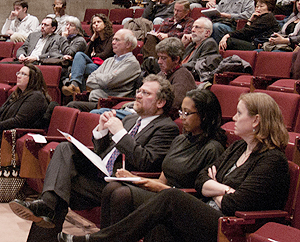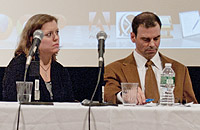Experts Discuss Gun Violence, Policy, Laws, Politics at Wesleyan

Gun laws in the United States need to be changed to protect thousands of lives, but meaningful change is not a sure thing, even in the wake of the tragedy at Sandy Hook Elementary School, three experts told a packed house at Wesleyan on Feb. 6.
The seminar, “Guns and Gun Violence: Crisis, Policy and Politics” featured three specialists in the legal, social and political aspects of firearms regulation, and drew a capacity crowd at the Center for the Arts Hall.
“The United States is not more violent, but more lethally violent (than other developed nations who have stricter gun laws),” said Matthew Miller of Harvard University’s School of Public Health. “ We have more serious, lethal violence.”
Miller is a physician with training in health policy and the effects of gun laws on rates of suicide and homicide.
He was joined by Saul Cornell of Fordham University, a specialist in the Second Amendment, who pointed out that the current constitutional debate is muddied by actual history.
The notion of self-defense was complicated in the 18th century and may not be relevant today, he said, noting also that the Second Amendment may have been rooted in a colonial requirement for male adults to own weapons, not simply a right.

“The right not to bear arms was (enshrined) in many state constitutions at the time,” he said.
Kristin Goss of Duke University discussed the politics of the gun control movement, saying the growth of social media and the number of gun violence survivors willing to be advocates had changed the debate. Still, despite an uptick in public favor of tighter gun controls, the polls done since Newtown have “bounced back to normal.”
“We may see agreement on background checks, (restricting gun purchases by) the mentally ill, armed guards in schools and tracking gun sales,” but tougher controls seem unlikely to be passed by legislatures or the Congress, she said.
“Forty nine percent of Congress gets an “A” rating from the NRA,” she said. “The gun rights folks are persistent.”
The seminar was sponsored by the Allbritton Center for the Study of Public Life. It was chaired by Leah Wright, assistant professor of African American Studies, and a lively Q and A session was moderated by John Dankowsky, host of “Where We Live” on WNPR.

